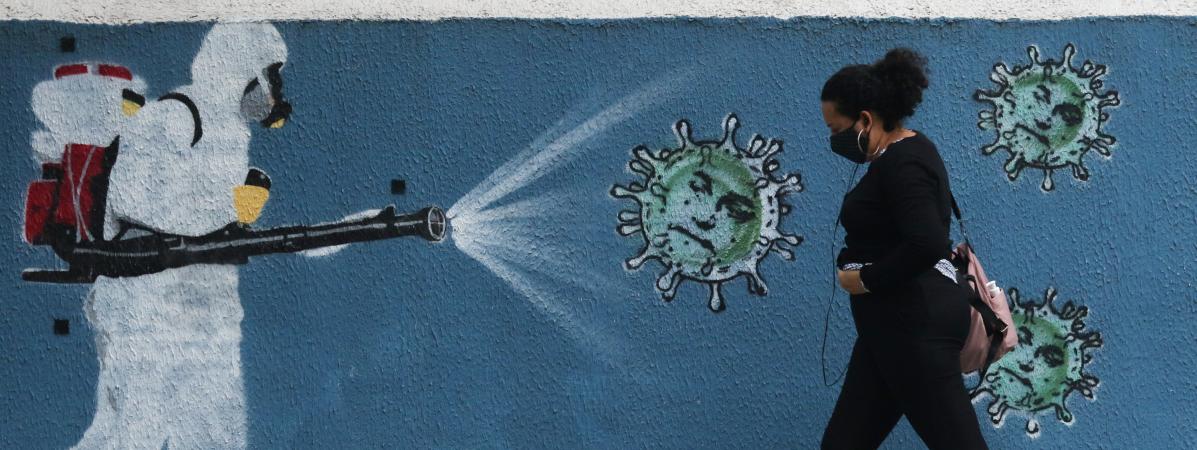RIO DE JANEIRO, BRAZIL – Brazil discovered last week a new variant of coronavirus more contagious than the previous ones, which complicates, even more, the already complex epidemiological panorama in the country and its neighbors, whose governments have recently redoubled their restrictive measures with border closures and more confinements to mitigate the increase of cases.

The new variant could be an evolution of the Amazon variant combined with the South African variant. It was detected in the city of Rio de Janeiro.
The worst moment for Brazil since the beginning of the pandemic
On Friday, April 2, Rio de Janeiro announced a partial extension of the pandemic measures adopted two weeks ago to restrict movements that were due to expire on March 5. In Rio, schools are likewise scheduled to reopen Monday, but non-essential commerce, bars, restaurants, cinemas, museums, and theaters will not be able to operate again until Friday March 9. Then they will do so within restricted hours.
Beaches will be closed until April 19, when the night curfew between 11 p.m. and 5 a.m. will also end, and nightlife will be reopened.
Tragically positioned as the country with the second-highest number of Covid deaths, with well over 330,000 deaths, Brazil is experiencing the most intense period of the pandemic, with hospitals saturated largely of the country.
March was by far the deadliest month, with 66,000 deaths, and experts predict a tragic April.
Bolivia and Chile close their borders
Thursday afternoon, April 1, Bolivia announced the closure of its border with Brazil, with whom it shares 3,400 kilometers of jungle and rivers, trying to stop Brazilian variants from entering the country.
Bolivia’s president, Luis Arce, said on Twitter that the measure would be in force for seven days in the country of 11.5 million inhabitants, which accumulates, for its part, more than 272,000 infected and almost 12,000 dead.
Bolivia extended until April 30 a decree regulating pandemic containment measures: this means that sub-regional governments can manage the opening hours of shopping centers, social, sporting, and cultural events, bars, and discotheques.
Chile also announced this week that it would close its borders from Monday, April 5, and during the whole month of April, given the record number of new infections.
This decision coincides with the highest daily number of coronavirus positives since the beginning of the pandemic: more than 8,000 in its last report, bringing the total to more than one million cases and 23,000 deaths. At its worst in 2020, the country never recorded more than 7,000 new cases.
Uruguay surpassed 1,000 deaths and suspended on-site classes
For its part, Uruguay, which until a few weeks ago was the region’s showcase country for excellent crisis management, registered 35 deaths from coronavirus on Thursday, April 8, a daily record, bringing the total number of deaths to more than 1,000, in the context of an escalation of contagions that threatens to collapse its health system.
More than 80% of Uruguay’s Covid-19 deaths occurred in 2021, marking a critical moment in the pandemic that last year seemed under control. Still, President Luis Lacalle Pou was reluctant to tighten existing measures to restrict mobility, arguing that his government does not believe in “a police state.”
Last week, the authorities decided to suspend on-site classes and include Easter, close state offices, and cancel public shows until 12 April. They also ordered the closure of thermal resorts during Tourism Week, which coincides with Easter, while until April 12, bars will have to close at midnight, duty-free shops at the borders will remain closed, and events and social parties will be banned.
Almost 20% of the Uruguayan population has already been inoculated with the first or second dose of the CoronaVac or Pfizer immunizer since the immunization campaign began on March 1.
Paraguay, without vaccines and with low compliance by the population
Paraguay, meanwhile, is going through a critical moment, with contagions on the rise and unable to use a batch of 100,000 doses of Covaxin vaccines donated by India due to lack of authorization, and all this in the midst of a total shutdown with low compliance to avoid sanitary collapse.
The country depends on the regulatory authorities of other countries such as Brazil, Argentina, and Mexico to use these vaccines when considering regional references for sanitary authorization.
Covaxin is in phase 3 testing, with more than 25,800 volunteers between 18 and 90 years of age, and has a high efficacy proven in clinical trials, for which only the certificate of good practice is missing.
On the other hand, a total shutdown has been in force for a week and will be in force until this Sunday, although there has been a low compliance level.
In their last report, Paraguayan health authorities advised that more than 1,600 people were infected, and 44 died, out of a total of 218,000 infected and 4,294 dead since the beginning of the pandemic.
Source: Télam

